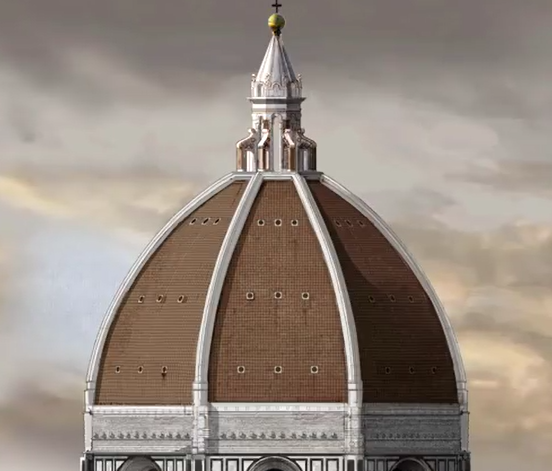原味人文风情:Imagine this: It's 1418 in Florence, Italy. You've been challenged to build a great dome for the Santa Maria del Fiore, one of the grandest cathedrals ever built, and you have no formal architectural training, no pressure, right? For Filippo Brunelleschi, a goldsmith and clockmaker, it was the opportunity of a lifetime. He considered the challenge carefully...then proposed a daring plan, using methods that experts don't fully understand even to this day.
想象一下:时为公元1418年的意大利佛罗伦萨。你接受挑战要为圣母百花大教堂建一个巨大穹顶,那是世上最雄伟的大教堂之一,而你没受过任何正规建筑训练--不用觉得有压力,对吧?对菲利波·布鲁内列斯基——一位金匠和钟表匠来说,那是千载难逢的机会。他审慎思考了这项挑战...接着提出了一项大胆的计划,运用了一种时至今日专家都不能完全理解的工法。
At the time, domes were often built as semicircles, but the town fathers required that Brunelleschi build an eight-sided dome that would be even taller and stronger. It would also have no central support system to hold it up during construction. Even worse, the dome's base was an imprecise octagon with no true center. But Brunelleschi had that covered. There would be two domes instead of one: an inner and an outer shell held together by giant brick arches and interlocking rings of stone and wood. The rings would work like hoops on a barrel, keeping the dome from expanding outward.
在当时,穹顶常被造为半圆弧形,但城镇长老们要求布鲁内列斯基建一个八面穹顶,那将更为高耸坚固。在建造期间,它不会有中央支撑系统撑起穹顶。更棘手的是,穹顶的基底是个没有准确中心的不规则八角形。但布鲁内列斯基解决了这个难题。他会建两个而非一个穹顶:由巨大砖拱和相扣石环与木环连结在一起形成内外墙壳。这些环就像木桶的桶箍一样,使得穹顶不会向外膨胀。
To move heavy loads hundreds of feet up, Brunelleschi designed ingenious new machines,including an ox-driven hoist and massive lifting devices far ahead of their time. So, revolutionary design, check; groundbreaking engineering, check; can-do attitude, check. But with no central support system, how would he actually build it
为了将重物搬到数百英尺高的地方,布鲁内列斯基设计出绝妙的全新器械,包含牛拉起重机以及先进的大型吊具。那么,革新设计有了;突破性工程策画有了;积极进取的态度也有了。但在没有中央支撑系统的情况下,他要怎么盖出穹顶呢?
First off, the masonry would have to support itself during construction. To do this, Brunelleschi lays the bricks in a herringbone pattern, which spiraled to the top of the dome,with vertical bricks acting as bookends to hold the others in place. They laid about one row a week, giving the mortar time to cure. At this rate, the dome grew at a snail's pace of about a foot a month. But perhaps most puzzling is how he was able to place the bricks with such precision.
首先,砖墙在建造期间得自行支撑。为了做到这样,布鲁内列斯基将砖块以鱼骨形摆放,螺旋向上到穹顶上方,直立的砖块就像书挡一样固定住其它砖块。他们大约一周摆完一排,让灰泥有时间变干。在这样的速度下,穹顶以极缓慢的速度一个月增高大概一英尺。但或许最令人费解的是他如何能如此精准地放置砖块。

Many experts agree that he used guide ropes.One theory states that ropes ran from a flower pattern on the work platform that showed exactly where the bricks should go. Another has ropes running from the dome center, tracing a series of cones that grew smaller as they ascended to the top. Still another suggests a different arrangement of central ropes and wooden templates. However it was done, it worked. The eight phases of the dome met at the top precisely, just as Brunelleschi had planned. In all, it took 16 years to complete the dome.
许多专家一致认同他利用了绳索引导。其中一个理论表示绳索是由绘于作业平台上的花朵图案牵引出的,精准标示了砖块该排的位置。另一说法则认为绳索由穹顶中心拉出,勾勒出越往上就越小的一连串圆锥形。又有一说则提出是利用中心绳索和木制模板。不论方法为何,都成功了。穹顶的八面精准地在顶端会合,正如布鲁内列斯基计划的一样。穹顶的完工总计花费十六年。
When he died in 1446, Brunelleschi left behind no sketches and no details as to exactly how he achieved his masterpiece. Today, it remains the largest masonry dome in the world, more than 500 years after it was built.
当布鲁内列斯基在1446年离世时,他没有留下任何草稿,也没有留下自己是如何完成这杰作的相关细节。如今,在其落成超过五百年之后,它仍是世上最大的砖造穹顶。













